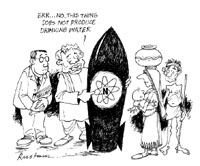Cost of weaponisation
 The social indicators are giving us estimates of the costs of nuclear weaponisation, its implications - economic and ethical - and what the future has in store for nuclear India. Though there was no noticeable increase in real terms in the defence expenditure in finance minister Yashwant Sinha"s budget for 1998-99, if the government goes in for significant weaponisation, funds will need to be diverted from other areas to meet this level of militarisation.
The social indicators are giving us estimates of the costs of nuclear weaponisation, its implications - economic and ethical - and what the future has in store for nuclear India. Though there was no noticeable increase in real terms in the defence expenditure in finance minister Yashwant Sinha"s budget for 1998-99, if the government goes in for significant weaponisation, funds will need to be diverted from other areas to meet this level of militarisation.
Commodore C Uday Bhaskar, deputy director of the New Delhi-based Institute of Defence Studies and Analysis, estimates that India would need about 100-150 nuclear war-heads to have a credible deterrent force. He pegs the cost of the weaponisation programme at about Rs 40,000 crore spread over 10-15 years with a required annual expenditure of Rs 2,000 crore to Rs 4,000 crore. The present defence budget stands just above Rs 40,000 crore."We are spending only about two to three per cent of our gdp (on defence) while China and Pakistan are spending about six to eight per cent. Our defence budget is quite modest if you compare it to them," Bhaskar points out.
J S Tendulkar, economist at the Delhi School of Economics (dse), says "The defence budget is not ethical. But no one talks about the economics of defence, because the issues of national security… are deemed to be much more important. The basic issue is of survival."
| Money talks Budget outlays for some ministries (in Rs crore) since 1989-90 | ||||||
| Year | Ministry of defence | Ministry of environment and forests | Ministry of science and technology | Ministry of rural development | Ministry of welfare | Ministry of atomic energy |
| 1989-90 | 15,761 | 210 | 515 | 2,220 | 552 | 1,411 |
| 1990-91 | 18,947 | 271 | 576 | 3,142 | 645 | 1,466 |
| 1991-92 | 19,964 | 339 | 532 | 3,521 | 778 | 1,510 |
| 1992-93 | 23,074 | 319 | 544 | 3,113 | 849 | 1,557 |
| 1993-94 | 24,434 | 359 | 744 | 5,075 | 1,007 | 1,807 |
| 1994-95 | 28,664 | 418 | 840 | 7,024 | 1,086 | 1,969 |
| 1995-96 | 27,656 | 435 | 928 | 7,718 | 1,330 | 2,074 |
| 1996-97 | 29,498 | 469 | 530 | 8,692 | 940 | 1,338 |
| 1997-98 | 36,189 | 543 | 617 | 9,095 | 1,389 | 1,284 |
| 1998-99 | 41,200 | 704 | 642 | 9,911 | 1,539 | 1,569 |
| Source: Central Government Budget Papers | ||||||
Shreekant Gupta is an environmental economist at the dse. "It is hard to estimate the cost of the weaponisation programme since it will depend on the nature and extent of the weapons inducted and the type of delivery system used. But it is certainly going to imply a significant increase in our defence spending. Part of it may be concealed in other parts of our budget under scientific research and therefore will be hard to detect," he points out. "In my view it is unconscionable that a country like ours should be spending such obscenely large amounts on "defence"," he indicates. He points out that the hawks for the defence expenditure will argue that:
• as a percentage of gross national product (gnp) our defence spending is very low (particularly compared to Pakistan), and
• per capita defence spending is very low.
In Gupta"s view, both arguments are fallacious as the relevant denominator should be defence spending as a percentage of government expenditure, compared to other sectors. "We spend a lot on defence as compared to, say, the environment. India is also one of the largest buyers of conventional weapons in the world," he notes. But the issue has more to it in his opinion. "In the ultimate analysis, this is not about economics but about ethics and morality in the land of Gandhi and Buddha."
Abhijeet Roy, an international financial expert, has another point to make. "A defence budget of 2.3 per cent is not much, especially when your neighbouring countries are spending so much. You cannot go against the past trends and reduce it now." But he offers a word of caution: "Over the long-term, there is a need to improve relationships with our neighbours so we can reduce our weapon strength. Obviously our diplomacy needs a lot to be desired."
In spite of the uncertainties about implementation of sanctions by different countries, it appears reasonably certain that welfare, development and environment sectors will take the hit rather than other segments of the society. Small wonder people from these sections are expressing serious concern about the fall-out of India"s nuclear programme.
